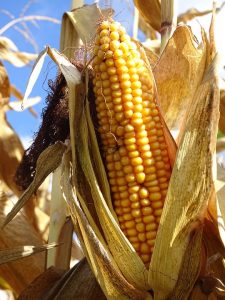When many of us think of popcorn we imagine it smothered in butter, salt, caramel, molasses, and any other delicious topping you can think of.
As such, people don’t typically consider the many health benefits of popcorn and how, despite it being recognized as a trivial junk food, it can be quite a cornerstone piece of one’s diet!
Whole Grains
Popcorn is the only snack food that is one hundred percent unprocessed whole grain. One serving of popcorn will provide more than seventy percent of the average daily intake of whole grain!
 Considering that the average person only consumes half of the recommended daily serving of whole grains, this significant finding means that everyone can be on top of their whole grain intake just by enjoying some of their favorite snack!
Considering that the average person only consumes half of the recommended daily serving of whole grains, this significant finding means that everyone can be on top of their whole grain intake just by enjoying some of their favorite snack!
While many health “experts” will say that one should avoid wheat and grain in order to lose weight and maintain a healthier diet, the USDA recommends that whole grains be eaten daily, as there are many health benefits that us humans shouldn’t be without!
The whole grain is divided into three parts: the germ, the bran, and the endosperm. The process of refining whole grains typically strips the grain of both the bran and the germ, which contain are very high in proteins, fiber, B vitamins, antioxidants, minerals and healthy fats.
Without the bran and germ, approximately 25% of the original protein value is lost, as well as a significant reduction in nearly seventy key nutrients.
Even though many refined grains are enriched after the refining process, it isn’t nearly as beneficial to one’s health as consuming the original whole grain itself without the refining process.
Germ
The Germ is the the embryo or bulk of the seed or “kernel” which has the potential to sprout into a new plant. It contains a lot of B vitamins, minerals, healthy fats and oils and protein.
Bran
The Bran is the multi-layered outer skin of the kernel and houses the bulk of the fiber within the whole grain, as well as protein, B vitamins, minerals and antioxidants.
Endosperm
The Endosperm is the food source for the Germ, providing essential energy and nutrients for the young plant so it can send roots desc
ending into the soil to harvest water and nutrients and eventually send a sprout to the surface to absorb the energy of the sunlight. The endosperm is the largest part of the whole grain and contains high volumes of starchy carbohydrates, proteins, and a small amount of vitamins and minerals.
Fiber
Dietary fiber is most certainly the largest health benefit of whole grains and popcorn in particular. It is recommended by health experts that adults consume 25 – 25 grams of fiber per day. Popcorn provides consumers with 4 grams of dietary fiber per 4 cups of popped popcorn.
Fiber is a great means to maintaining a healthy regularity of bowel movements and also will make one feel more full for longer which, in turn, means one is inclined to eat less. Adequate fiber intake also lower the risk of developing cardiovascular disease, reduce LDL cholesterol, and decrease one’s risk of type 2 diabetes through regulation of blood sugars.
Studies also show that those who have a healthy intake of dietary fiber require need fewer laxatives. This is because fiber stimulates peristalsis in the intestine — the wave-like motion that moves food through our digestive system — and induces the secretion of digestive juices, both of which ensure a healthy and happy digestive system!
Polyphenols
Polyphenols are phytochemicals — chemicals found abundantly in natural plant and food sources that are high in antioxidants. Polyphenols contain numerous health benefits, including prevention of osteoporosis, cardiovascular disease, many different forms of cancer, neurodegenerative diseases and diabetes. They are also known for neutralizing free radicals, which damage cells and are responsible for rapid aging. Bye bye, wrinkles — Hello, popcorn!
Antioxidants are typically found more commonly in fruits of vegetables. Some examples of primary antioxidants used by the body are Vitamin E, Vitamin C, beta-carotene, lutein and lycopene. One study conducted by the University of Scranton in 2012 found that a serving of popcorn contains 300 mg of polyphenols — the antioxidant under scrutiny — whereas a daily intake of fruits and vegetables typically contains between 200 – 250 mg.
In popcorn, the polyphenols are typically found to be more highly concentrated in the hull, so popcorn without the crispy husk may not contain as much of the healthy antioxidant. Needless to say, popcorn sure sounds polyphen-tastic!
Protein
While popcorn isn’t a substantial source of protein, it does indeed contain it! One cup of air-popped popcorn contains a popping one gram of protein, as opposed to the less healthy microwaveable option which contains .80 grams per cup. Basically, if you are looking to get beefed-up or have defined muss-kulls, you may not want to rely on this tasty cinematic snack food for your gains.
Vitamin B Complex
Corn is naturally abundant in B vitamins. Particularly in B3, B6, B5 (pantothenic acid) and B9 (folate). B Vitamins are essential to many processes across multiple bodily systems and functions such as energy and metabolization of nutrients in the body and act like oil in a car — they keep the body fine-tuned and running efficiently.
Vitamin B3, or Niacin as it is commonly known, has been found to potentially treat depression, can assist in the treatment of acne and even increase the levels of HDL cholesterol (good cholesterol) in the blood.
Vitamin B6, or pyridoxine, regulates the levels of the amino acid homocysteine, which is associated with heart disease. It is also extremely influential when it comes to mood and sleep patterns as it affects the body’s production of serotonin, melatonin and norepinephrine. Some studies even indicate that Pyridoxine can reduce inflammation for people with conditions such as Rheumatoid Arthritis.
 Vitamin B5, or Pantothenic Acid, is responsible not only for fats and carbohydrates for energy, but also for the production of sex and stress-related hormones such as that of testosterone. Pantothenic acid can be found in almost every food group, it is even represented in the name — the word pantothenic actually stems from the Greek word pantothen, which means “from everywhere.”
Vitamin B5, or Pantothenic Acid, is responsible not only for fats and carbohydrates for energy, but also for the production of sex and stress-related hormones such as that of testosterone. Pantothenic acid can be found in almost every food group, it is even represented in the name — the word pantothenic actually stems from the Greek word pantothen, which means “from everywhere.”
Vitamin B9, also known as Folate, has been found in suggestive studies to deter depression and even prevent memory loss. It is also very important in pregnant women as it supports prenatal growth and can even assist in the prevention of neurological birth defects.
Manganese
Manganese is a mineral found in very minuscule trace amounts throughout the body. It assists the body in forming connective tissues, bones, blood coagulation or clotting and the production of sex hormones. While the percentage of manganese in popcorn is very small, it still remains one of the primary minerals in the super snack food.
Magnesium
Much like manganese, magnesium is found in trace amounts in popcorn, but nonetheless is very beneficial for one’s health. It is a chemical that is crucial to nerve transmission, muscle contraction, blood coagulation, energy production, nutrient metabolism, and bone and cell formation.
Lactic Acid
Whole grain is also very high in lactic acids, which promote “good bacteria” in the intestines. These probiotic organisms aid in digestion, promote more efficient nutrition absorption, and can even strengthen the body’s immune system!
In a Corn Hull…
In corn-clusion, popcorn is a great source of one’s daily intake of whole grains. However, one shouldn’t rely solely on this wonder food for a healthy diet, and even if one was counting on this food as a cornerstone of their diet, there are certain criteria that must be met in order to optimize the nutritional value of this tasty food. Microwaveable popcorn would be one to avoid if one is looking to inherit the health benefits of popcorn, seeing as how it is laden with additives and unhealthy toppings, such as torrents of sodium and saturated fats.
Much like all else, moderation is key as well as the patience and willingness to enjoy this snack more naturally (this means sacrificing convenience and laziness). Ways to do this include air popping or cooking the kernels on the stove top, as well as topping the popcorn with ghee or coconut oil and a nice pinch, or handful, of sea salt!
At the end of it all, it seems that popcorn is not only one of humanity’s favorite junk foods, but that it also has wonderful potential to be a bountiful source of vitamins, minerals, antioxidants, fiber and whole grain through transformation of how we view and use this delicious snackaroon.

